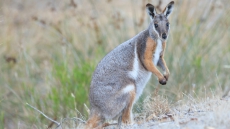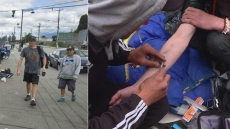Sikh Women around the world have at least one thing in common, their surname- Kaur.
When Vancouver-based Jessie Kaur Lehail and Saji Kaur Sahota met for the first time at an event in 2015, the duo bonded over feminism, identity politics, and their mutual realisation that many women in Sikhism stood in the shadows of their fathers or husbands.
They realised that there are a few historicized Kaur stories, often are defined in relation to their male counterparts. Often their full contributions as thinkers, poets and warriors unto themselves have been eclipsed by historians, policy, and our communities.
But, a new generation of Kaurs exist as teachers, lawyers, artists, entrepreneurs, doctors, homemakers, filmmakers and more, all carrying on the movement of revolutionary women. T
hey have found brave new ways to reflect their identities while offering their own unique voices to public discourse. We are proud to call them our contemporaries -- they are sources of inspiration, wisdom and leadership, who deserve to be known.
"Women make up 48 percent of our community and yet our voices are never heard," Lehail told. "There is very minimal conversation about how women have contributed to Sikh history. We're in the background for Sikh religious events."
The Kaurs highlighted by Kaur Project are modern-day heroines blazing their own paths.
For every woman featured in the “Kaur Project,” Sahota does a photo shoot and Lehail conducts a 20-minute phone interview.
"The first question I ask each woman when we sit down for our interview and photography session is, What's your story?" Sahota said.
The women discuss how Sikhism has helped them navigate their lives from their careers, families, mental health, and body image, among other subjects.
Some of the themes of the interviews are specific to Sikh or immigrant communities, Lehail said, “but a lot of what’s discussed is applicable to any community and almost all women.”
"When they share painful things and private things we have to make sure that they're comfortable with what we're sharing," Lehail says. "It should empower their lives not endanger themselves at any point, so we don't include information about their families, jobs or spouses."
The Kaur Project is meant to be a form of therapy for the women that are profiled, according to Lehail and Sahota. The pair understands the need for a space like that due to their own early experiences with racism and misogyny.
There are 60 women Lehail and Sahota have featured so far, here are some the amazing stories:
Rupinder Kaur - Peacekeeper “For me, being a Kaur represents a sense of fearlessness. It’spartly being maternal, but not in the normal meaning of the word, just someone who fights for equality and justice. I think of Mai Bago. She was a warrior and I can’t help but think of her and not want to be her. She fought for what was right and that is exactly what I want to do. I was born and raised in Surrey. My entire life I have looked up to my mom, been in awe of her, proud of her abilities and her strength. She is a hard worker and has made several sacrifices to raise my siblings and I. She’s the role model every young woman needs. My mom, during times of difficulties, is the person who is able to see the positivity of a situation. Really though, she embodies the pillars of Sikhism and has shaped my outlook. Both of my parents instilled Sikh values in our household. My father ensured we spoke Punjabi at home and I have fond memories of going to the Surrey Gurdwara in the evenings with him. I grew up as a bit of a tomboy. I hung out with my brothers doing things boys typically do. I remember my mom would try to make me wear dresses but I wasn’t interested. It wasn’t until high school I started dressing more like a girl should. I knew at an early age law enforcement and being a RCMP officer is what I wanted. Family, especially my mom, tried to change my mind because it’s considered a dangerous job. She finally accepted the idea, but only if I agreed to attend University and obtain a degree. RCMP training in Regina, Saskatchewan was a huge change, it was an experience that completely changed my life. It tested my strength and willpower. I find it so interesting, my Babaji was in the Indian British Army and his dream was to have a grandson follow his footsteps and make him proud. His photo hangs in the family home and every time I look at his photo, I know I have made him proud. I started my policing career in Richmond, with General Duty and then as School Liaison Officer. I then moved into detective work and took on investigating more complex files. I am now a Corporal, Road Supervisor in Surrey. I admit, I was unsure of what people, especially our community’
A post shared by Kaur Project (@kaurproject) on Jan 25, 2017 at 10:56pm PST
Gurmit Kaur - Baarwaali “Being a Kaur is essential to me and my identity. It has aligned with who I am since I was born. I don’t know anything beyond this. For the last twenty years I have taken Amrit and my connection has become even stronger. Because of my surgery, I can’t wear my Kirpan, but my relationship with Babaji has developed and grown as I have gotten older. I thank my Dad for building the foundation of who I am because he didn’t eat meat or drink alcohol. Months before the Partition there were constant rumblings. There was unrest and things went from rumblings to a sudden whirlwind. We left everything in a moments notice. I remember it was noon and there was a government call out to evacuate our lives, our homes, and our Desh. We were told our Partharpar village, in what is now Pakistan, was no longer home and we had to go to the same named village in what is present day India. Overall, I’ve had a good life. Its been easy, relative to other women. My childhood was a breeze compared to other people. I was treated like royalty. Never asked to do work, I had so much love and comfort. I was twelve years old when the Partition happened and our family walked all the way to India. It took us slightly over a month and we were scared for our lives. We had to stop every night and we would create a fire and set up. We didn’t want to be separated so we stayed together. It was a matter of survival and if you think about it, ‘how could we eat roti without one another?’ We made a pact that when we arrived safely in our new Partharpar we would do a khand paat. When we arrived, I lived with my Masi because I had gotten sick. We received some land and a house, and started to do farming. It was a hard adjustment. It never felt like our home. In those times, school was not an option for girls, so I didn’t even go to school. I sometimes think, rarely, but the thought has come across my mind of what life would be like with schooling. I learned everything at home. I was married when I was 20 years old, but I didn’t leave to live with my in-laws until I was 23 years old. I know this was not that common, I was lucky that I had a longer time with my parents.
A post shared by Kaur Project (@kaurproject) on Nov 27, 2016 at 11:27am PST
Chanan Kaur - Refugee “For me Kaur literally means whatever God provides us. Coming from a place where everything is taken away, having no money, no direction, it is my belief, my faith in something bigger that helps me to overcome the heartaches and rejoice in the goodness. I was eight, nearly nine, when the partition happened. I remember being in our home, where Pakistan is now and hearing a bit of noise. The weeks and months beforehand there were problems, we heard rumblings, and would hide at the local Gurdwara. Never did we think we would have to evacuate our homes and lives. It happened all of a sudden, my older and younger brother and I were told to evacuate quickly. We could hear bullets and then a truck appeared from another village that was rounding up children. We barely got to say good bye to our parents. I remember thinking we were going to the city. It was scary travelling by ourselves, I tried to be brave, but I cried all the way. The next morning we found our mom, dad, and mamaji at the camp that was set up. My dad didn’t make it to the next leg of the journey, he fell ill and died there. We were separated from our mother, we became estranged children. We had no money, no belongings and anything could have happened to us. I believe though, God was watching over us. With the kindness of strangers, we were fed, given shoes, and they purchased us clean clothes. My younger brother and I were separated from our older brother for part of the journey. We cried and cried, and then near the train, which we were supposed to jump onto, we found him. For some time, my older brother left us with some family, at a makeshift camp. The three of use then moved to our government mandated new home. We had bulls and cows and shelter, but it never felt like home. This where I learned to make roti, it was horrible and raw, but we ate it. I would have the divya on all night. I would go with the neighbour girls to this flea market to get free dishes that were chipped and slightly broken. That’s what we would use and I created a stockpile so I could show my mom when and if she returned. I used to go to the highest point on the property and look for ...
A post shared by Kaur Project (@kaurproject) on Nov 21, 2016 at 12:25am PST
Paaras Kaur - Seeking Strength “I think of Kaur as being the daughter of Guru Gobind Singh Ji and as one who upholds the Sikh principles. I didn’t really understand the concept of Kaur until I was given Amrit and was born into Sikhi in 2002. Prior to this, I didn’t know what it meant and its importance was not clear to me. Since then, it has been a learning process in understanding my role in society as a Kaur. I think a lot of my internal conflicts stem from being the only daughter in my family and growing up as first generation Punjabi in Canada. While trying to maintain Punjabi culture, my parents were unsure of how much western culture we were allowed to observe within our household. My brother and I both had many challenges in understanding our identities within the Canadian culture as a result. Simply by being a girl however, I was placed in a weaker status in Punjabi culture. It was clearly apparent that I was thought of as the weaker gender and constantly told, “girls don’t do this or that etc.” This thought never made sense to me and I struggled with trying to understand it, as there was never an explanation. I had no choice, but to accept it within my family and culture. I think this is the beauty of the Sikh faith, it is an egalitarian religion and there is a level playing field for both men and women. Really, there should be no status differences between the two genders, but culture and other factors play into things and make us believe otherwise. While practicing medicine, I see many Sikh women being drawn to me as patients. As a practitioner, I try to use this opportunity to educate them on the importance of taking care of themselves and their bodies. Even with subtle changes like diet adjustments, they can make huge personal strides. As Kaurs, we break down our bodies, on many levels. I think this has to do with never being given any importance or value on nurturing ourselves and it all comes back to that lower status that was deeply imbedded into our psyche. I think this is why I use medicine in this population to convey the importance of self-care and self-worth. Our bodies are vessels that house the light of the Creator....
A post shared by Kaur Project (@kaurproject) on Aug 28, 2016 at 2:30am PDT
Harkiran Kaur - Purpose Seeker “Growing up, I went to Khalsa school and Kaur was part of my name. I think it was a generational thing with my parents, I never questioned it because I went to a Sikh faith school. As I got older and researched it, I found more of a connection to it. Now, I think of Kaur as a mixture of power, strength, and equality. As I get older, I use Kaur as more revolutionary in terms of standing up for others in need and more importantly for yourself. I think its also important that as I get older, depending on the stage of my life, the meaning of Kaur also changes and I think it will continue to evolve. During my teens, it was about equality, now its about empowerment. In my late teenage years, I was shaped by societal, cultural and family pressures. For example, I wanted to go abroad for school and was told I couldn’t do that because I was a girl. These types of roadblocks became the norm and deflated by it, I gained a lot of weight, like 254lbs. The weight made me feel invisible and I felt captive. That captivity was self-induced and I became anti-social by not attending social events like weddings or hiding in my room when people to my house to socialize. I also felt, my family was embarrassed to be seen in public with me. In 2006, I wanted to start a bhangra team and was told this is not something girls do. It was suggested I do giddha and not bhangra. I had to lie to my parents, saying I was attending my brother’s practice. Little did they know I was coaching my brother’s team. I was the only female ever to teach an all guys competitive team and have now done this for 10 years. My love for bhangra helped me show up and get to know lots of people. It was during a journey to North Carolina, to a competition I was judging that a lightbulb came on. I couldn’t buckle my seatbelt and needed an extender, it was at that point, I knew I had to do something about myself. It was my own decision, I wasn’t forced. So in 2013, I sought out help from trainers and nutritionists to help me get on the right path and lost over 100lbs. I felt like the harder the journey got, the closer the walls got. I kept sane by delving into myself, which..
A post shared by Kaur Project (@kaurproject) on Jul 28, 2016 at 2:04pm PDT
Arma Kaur - Inquisitive Engineer “When I was really little my parents sent me to Punjabi school on the weekends to learn to read and write Punjabi. I think being there helped me connect with the roots of the community. It was there I learned that Kaurs are special, hold importance and are meant to be equal in society. This concept of equality spilled over into other parts of my life. My parents encouraged me to participate in sports and dance. I was in track and field, skating, swimming, and dance, particularly jazz and ballet. Living in Abbotsford and despite there being a large Punjabi population, I was the only Indian girl in ballet. It didn’t even cross my mind until other people pointed it out. I was just raised that I could do anything and that I didn’t have to refrain from doing things because I was a girl, Indian, or a Kaur. I just did things because they felt right. I think a lot of who I am is credited to the values of Sikhi. Values like sharing, humility, openness, respect, and learning are what I live by. I am not religious in that I don’t go to the Gurudwara or do paath, but I live my life following the Sikhi values I learned from Saakhis as a child. To me, the word Sikh may literally translate to student, but to be a student you must be willing to learn. I was a super nerdy kid. I loved to read and learn and I don’t think those skills have ever left me. I spent tons of time reading in the library or lugging big stacks of books home. I just loved school and learning. I love how my profession combines a heavy science base in the context of our world. As a geotechnical engineer my learning never stops. I have been an engineering consultant for nearly a decade and I am never bored. I continue to learn and be challenged by new things every day. For example, when I am working on a highway widening project, I examine a multitude of variables and make complex decisions. It’s very fascinating. Sometimes it’s hard being one of the few females or Kaurs in my field of work. I have had challenges because I am a woman, a minority, and young. Early on, people thought I was hired on as admin or that because I was a woman I couldn’t do field work.
A post shared by Kaur Project (@kaurproject) on Sep 18, 2016 at 10:50am PDT
Harman Kaur - Poetess “As an Amritari Sikh woman, I use my writing to talk about the cultural and religious scrutiny women face. In all honesty, being a Punjabi girl is hard enough with the pressure to uphold family and in-law honour. Add to that, male dominance and traditions, it is a lot of pressure. Then you have someone like me, who wears a dastar, which opens up the opportunity for more societal critique and pressure to not screw up. For me taking Amrit was a personal choice. It was something I realized I needed to do at the age of seven. My parents had always focused onme connecting to my roots. At a young age, I met with Sangat and learned kirtan and gatkha. My parents were initially not convinced about me taking Amrit, they came around eventually and then decided to also take this path. Like many teenagers, I had a tough time in school. I was teased because I looked differently, I had arm hair and then when I decided one day to tie a dastar, this all magnified. I’d be lying if I said that it didn’t effect me in any way, but in the end the empowerment and connection to my spirituality outweighed any insults. My parents helped by telling me that I would be facing discrimination and that at anytime, I had the personal choice to remove my dastar and simply cover my head. I’m sharing all of this because I feel there is an automatic stereotype that families, parents especially who wear dastars are forcing their children. I can confidently say, this is not always the case, this has been my choice. Then there is perception of perfection, people pointing out to me how bad it would be for me as a dastar wearing woman to bring shame to the family. This judgement and categorization within the Sikh community is something I am exploring. I grapple with it. Wearing a dastar, works for me. It may not for someone else. That does not mean, I am a better Sikh than someone who doesn’t. Sikhism is about your own personal journey, your relationship with God. I have to say my outward beauty has also been something I have had to work with. While I feel beautiful and empowered with my dastar, my appearance does not fit normal beauty ...READ MORE kaurproject.com
A post shared by Kaur Project (@kaurproject) on May 20, 2016 at 6:25pm PDT
Sunny Kaur - Student “I believe Sikhism is based on humanity. Being a just person. I find it intriguing, us coming from different backgrounds and beliefs, yet connected by these tenets, bigger than ourselves. Really though it is about giving back to our community, our family. For me, any journey, whether it has been education or family-based has been about challenging the concept of truth. My findings have been that we as beings are always learning and that really there is no absolute truth. Our job, in my opinion, whether it be familial, personal or educational is about continuing to challenge ourselves. Obtaining knowledge, studying, and learning through academics or other people (whomever I come across) has been about observing and understanding other perspectives. Faith is a personal relationship with God or whatever higher power you choose to believe in. As I get older, I am constantly asking myself, what is it that I believe in and feel it is my personal responsibility to challenge everything. My questions are introspective and include: why we do the things we do? why there are so many labels linked to Sikhism, like cultural sikh, modern sikh, or this or that. Why is there such a focus on following constricting rules and why we choose this? Really though, its all about choice. I am a believer in whomever we come across, we mirror. Rather than be challenged by this, we need to understand what this reflection says about us. To take a step back and understand why we are doing what we are doing. This journey of the self, is what I think is the backbone of sikhism. Selflessly giving back and recognizing that this religion is fluid, in constant change. I wasn’t feeling fulfilled in my career and I tasked myself to understand why I was not fulfilled. I found my calling so to speak by completing my Masters in Human Rights and International Politics and was so engrossed in my studies that I decided to purse my Ph.D. While studying, I wanted to give back and created a non-profit organization that helps with providing a safe space for male and female violence and trauma victims.... Read More at kaurproject.com #kaurproject
A post shared by Kaur Project (@kaurproject) on May 11, 2016 at 5:03pm PDT




